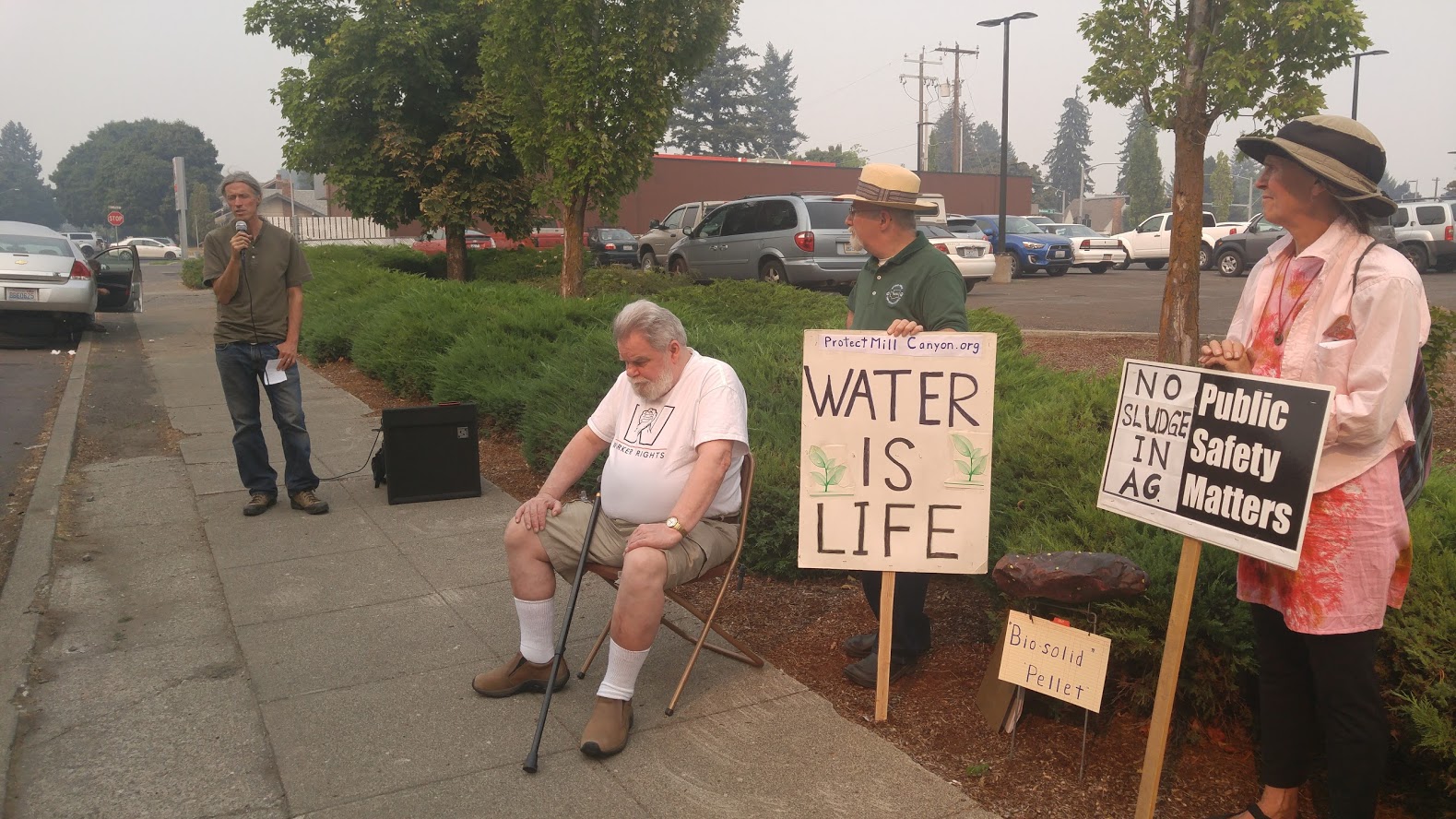Urgent Action Alert!
The State of Washington Department of Ecology proposes to issue a Statewide General Permit for Biosolids Management on August 4, 2021. Notice has been published in the State Register. Ecology is accepting comments until 11:59 PM July 1, 2021. Read their public notice.
SEND COMMENT TO ECOLOGY BEFORE JULY 1:
It’s time to stop spreading sewage sludge on our farms.

Background:
The 1987 Federal Clean Water Act reacted to pollution of waterways by promoting development of municipal sewage treatment plants.
In 1992, the Washington State legislature deemed “biosolids” (the non-liquid filth byproduct of those treatment plants before their effluent discharges into rivers) to be a beneficial resource and mandated that the Department of Ecology promote its use on soil. (Garbage out of the effluent, and garbage back in to our crops). This foolish mandate from the state, based on very outmoded science, if any at all, has made the Department of Ecology into an active promoter of pollution, rather than an independent regulator in the public interest.
A 2009 U.S. Environmental Protection Agency study concluded that all sewage sludge contains toxic and hazardous elements.
In 2018, the EPA’s Office of Inspector General concluded that they haven’t the means to prove “biosolids” safe.
Our main concern with a five-year re-authorization of how the Department of Ecology manages the program of land application of sewage sludge is that the material is host to an unknown amount of contaminants which constantly go down the drain in municipalities. They only test for nine heavy metals, nitrogen and selected pathogens. Unexamined are the many chemicals, micro-plastics, pharmaceuticals, and the infamous alphabet soup of ubiquitous super toxins now headed by PFAS (Per- and PolyFluoroAlkyl Substances).
Of course none of this matters to the Department of Ecology, which is in the grip of the waste and other polluting industries. Ecology staff is very aggressive in pursuit of their “partnership” (Ecology caseworker’s term) with one of the state’s main wholesalers of sludge, Fire Mountain Farms. FMF has been repeatedly slapped on the wrist by its partner, Ecology, for code violations like storing chemical wastes in the same piles of “biosolids” that it land spreads around the state. FMF intentionally created a “mixed” product to spread on agricultural fields that sometimes was comprised of as much as 15% of listed hazardous waste. A search of Ecology documents by Yelm-based Preserve the Commons found that much of it was flammable with large quantities of paint thinner.

Organic farmer Tim Pellow speaks to a 2017 combo demonstration and press conference organized by Protect Mill Canyon Watershed outside Spokane office of Department of Ecology.
In the case of the permit issued for the farmland neighboring Mill Canyon in Lincoln County, home to commercial organic food producers and a natural spring supplying many neighbors drinking water (directly downhill from one of the targeted wheat fields), the concern was about migration of toxins through flooding, wind storms and the fact (established by USDA soil maps) that most of the farmer’s land is classified as HEL, Highly Erodible Land. Fortunately, local citizens organized through Protect Mill Canyon Watershed to block that land application.
In many other such battles around Washington, “Biosolids” (the marketing name for the sewage sludge) is heavily pushed by Ecology as free fertilizer for farmers, and compost for gardeners. Read the labels of what you buy in the gardening stores. Ecology says “the draft permit streamlines some requirements, reducing the regulatory burden for the [biosolids industry] in the state.” This matches the complaint expressed (at a public meeting) by one of the officers of FMF that “there is too much paper work” while submitting blatantly inadequate and incorrect boiler plate for the required environmental analysis of the proposed Lincoln County site that was to be sludged.
Almost weekly, new studies come out around the world criticizing the practice of conditioning soil with sewage sludge as dangerous folly. Of course, it might seem futile to generate comments to the Department itself, rather than to a higher independent regulatory authority. Unfortunately, this is the system we are stuck in.
The Sierra Club has been helping organic farmers and small communities across Washington to resist contamination from nearby land applications or storage piles of sludge. We’d like to see Ecology replace “best management practice” with “independent current science” as a guideline. We call on the state to seriously research alternative methods of disposal such as pyrolysis, gasification or extraction of useful materials.
To view the critics’ side, please view a recent Sewage Waste Webinar on the Northwest Toxics Communities Coalition website: https://nwtoxiccommunities.
Stories of 3 local Washington State battles against contamination of farmland begin around the “25 minute” mark in the linked webinar above.
Please comment on the renewal of Ecology’s dirty business before the July 1 deadline.
Go here to Just Say No!
For more information or to comment by email or postal mail, please contact Emily Kijowski, Biosolids Technical Specialist, Department of Ecology, P.O. Box 47600, Olympia, WA 98504-7600, email emily.kijowski@ecy.wa.gov, phone 360-789-6592. Remember to identify the title of the document you are providing comments on: Statewide General Permit for Biosolids Management.
